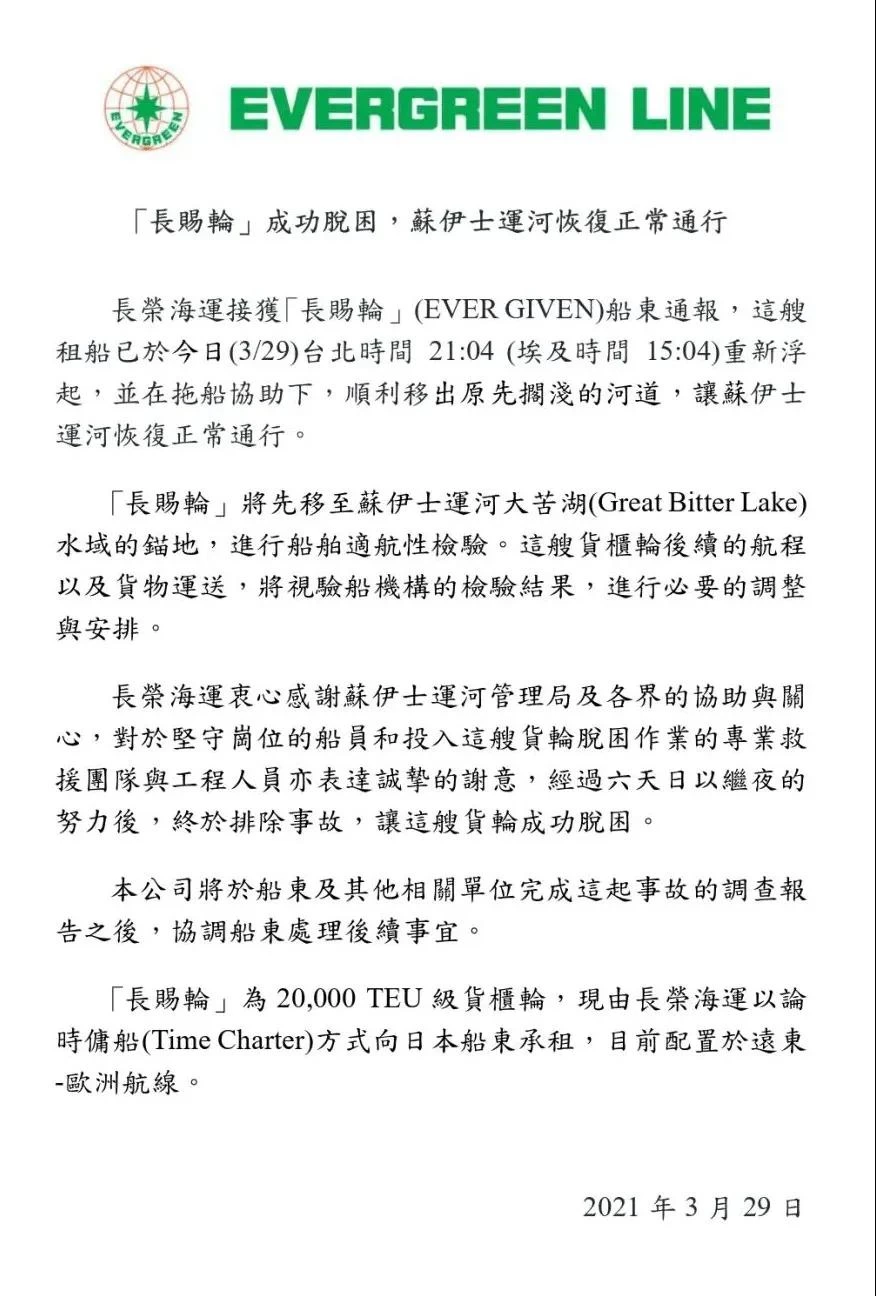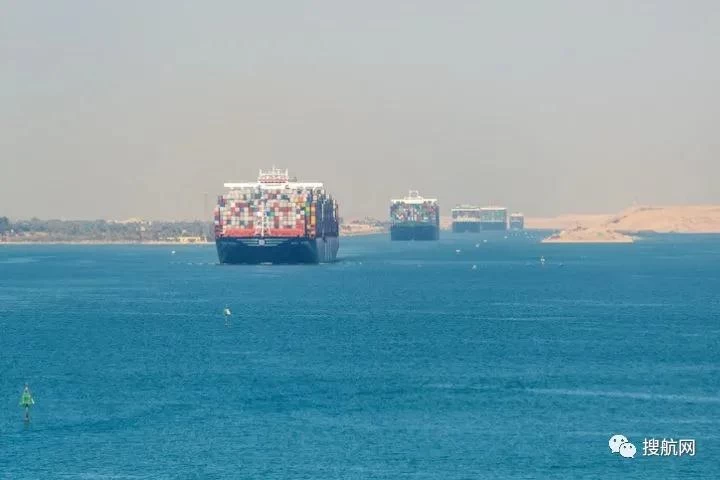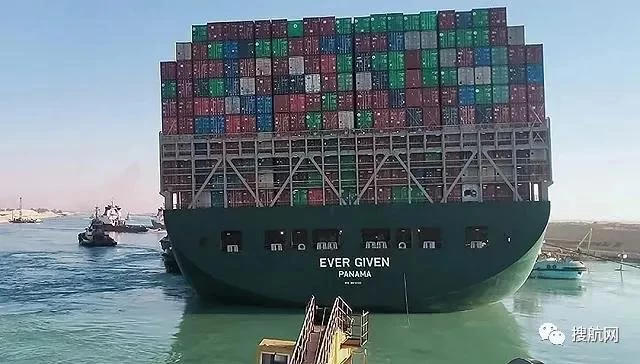The Suez Canal resumes navigation, and it will take a few days to clear more than 400 stranded ships! Supply chain delays may cause product prices to rise
Jim
Sunny Worldwide Logistics
2021-03-31 10:57:37
The giant freighter Ever Given, which had been “horizontal” on the Suez Canal for six days, finally got off the ground on Monday and was towed to the Great Bitter Lake. Subsequently, the world's most important maritime artery resumed navigation. According to the authorities, it is expected that the canal will resume normal operation within a few days. According to Bloomberg News, Suez Canal Authority Chairman Osama Rabie said at a press conference held on Monday night that it may take nearly three days for all queued ships to pass through the canal, and it is expected that the canal will return to normal within four days. Operation. Changrong Shipping, the operator of "Changci", said that the ship will first move to an anchorage in the waters of the Great Bitter Lake for seaworthiness inspection. Subsequent voyages and cargo transportation will be subject to the inspection results of the survey agency, and necessary adjustments and arrangements will be made.

In addition, Osama Rabie, the chairman of the Suez Canal Authority, told reporters that after the 400-meter long-giving ship got out of trouble, it is expected that by early Tuesday morning, 113 ships will pass through the canal in both directions. He said that there are currently 422 ships waiting in line to pass, and it may take three and a half days to clear these ships.
According to a shipping analyst, the container market will be affected by the accident for 2-3 months. He predicts that due to increased costs, carriers and shippers will start a tug-of-war on surcharges. In addition to the already high freight rates, congestion in Mediterranean ports and exporters who have to wait for their cargo to be shipped, as well as long delays in shipping thousands of empty containers to Asia. Lars Jensen, CEO and shipping analyst of Seaintelligence Consulting, a well-known shipping consulting firm, predicts that although the blocked Suez Canal will resume traffic, the container market will have a strong impact in the next 2-3 months. He said that although the waiting ships may be cleaned up within a week, the problems of container companies and global supply chains have not ended here.

As the container ship cannot reach the port, cannot unload the cargo and load the new cargo on the ship, some European flights will be cancelled. In general, once the delayed ships from the Suez Canal arrive, the port will face great pressure. Analysts also said that a large number of ships passing the canal in a short period of time may cause congestion in European ports such as Rotterdam and Antwerp, thereby extending the waiting time for unloading at the destination. Shipment of empty containers to Asia will be delayed "We cannot avoid the fact that shipping empty containers to Asia will be delayed, and Asia is in urgent need of empty containers, which may be delayed by 1-2 weeks. Therefore, as we have seen in the past 6 months, there is a lack of containers and The congestion problem of large ports will continue to exist for some time to come." Jensen predicts that in recent days many ships have diverted to avoid long queues and are now heading to southern Africa. These ships will continue to sail. " "It makes no sense to make them turn around, because they will eventually be the last to pass the Suez Canal."
In addition, according to the analyst, it is difficult to assess whether queuing will result in higher shipping costs. He predicts that there will be a tug of war between the carrier and the shipper over whether the Suez Canal surcharge is reasonable. "Freights have risen significantly, so shippers may argue that the carrier can afford the additional costs caused by the delay. On the contrary, the carrier has the right to bear the additional costs beyond its control and expects others to help them pay for it," Lars Jensen said, "If the shipping company makes a claim, it won't be surprising."
The Suez Canal is located at the key point of the intercontinental zone of Europe, Asia and Africa, connecting the Red Sea and the Mediterranean Sea. The income from the canal is one of the main sources of Egyptian national fiscal revenue and foreign exchange reserves. The Russian satellite network reported that Deutsche News Agency quoted the international insurance giant Allianz Group to estimate that the interruption of the Suez Canal shipping will cause losses to international trade between 6 billion and 10 billion US dollars per week. Allianz Group pointed out that in 2019, as many as 1.25 million tons of goods were transported through the Suez Canal, accounting for 13% of the total global trade. Allianz said: "This accident will cause delays in the delivery of daily products to consumers around the world." Analysts of Allianz Group believe that the blockage of the Suez Canal will exacerbate the problem of delayed or cancelled deliveries in international trade. Allianz pointed out that the impact of this incident on Europe may be comparable to the consequences of the first European blockade due to the new crown epidemic in the spring of 2020, and the impact on the United States may be even greater.

The delay of waterway cargo ships may affect the transportation of products in Europe and even the United States, including Chinese coffee used in products such as toilet paper and Nescafe. Chinese coffee is the second largest variety of coffee produced in the world, accounting for about 30% of global coffee production. Jennifer Biskelly, the founder of technology company Interos, told suppliers that the accident could cause supply chain problems for companies ranging from oil to cars, bicycles, clothing and electronics. Experts pointed out that supply chain delays caused by the congestion of the Suez Canal may cause product prices to rise.



















